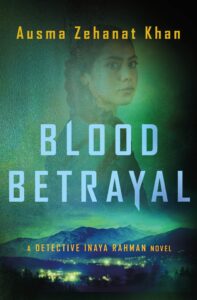Detective Inaya Rahman #2
 The second novel in Ausma Khan’s Detective Inaya Rahman series is as powerful and moving as the first, Blackwater Falls. I think police novels are at a tough point at the moment because of recent, tragic events involving police violence. Khan looks at policing from a different angle, approaching her novel from the point of view of a Muslim detective who works for Denver’s CRU, or Community Response Unit. The CRU takes on cases that are racially sensitive, and in both this novel and the first, the action is centered in Blackwater Falls, an idlyllic (seeming) town just outside of Denver.
The second novel in Ausma Khan’s Detective Inaya Rahman series is as powerful and moving as the first, Blackwater Falls. I think police novels are at a tough point at the moment because of recent, tragic events involving police violence. Khan looks at policing from a different angle, approaching her novel from the point of view of a Muslim detective who works for Denver’s CRU, or Community Response Unit. The CRU takes on cases that are racially sensitive, and in both this novel and the first, the action is centered in Blackwater Falls, an idlyllic (seeming) town just outside of Denver.
Race is front and center in Khan’s stories, and not simply because her main character is an Afghani refugee. Her Lieutenant, Seif, is a Palastinian refugee, and the squad also includes a Mexican immigrant, Catalina. On the periphery is a lawyer, Ayeesha Adams, a community organizer. She often appears on the scene of the crimes the CRU is investigating, as they always involve people of color. Her suspicion of the police in general is somewhat tempered when she’s dealing with the CRU – but not completely. She almost functions as an outside conscience.
Two tragic deaths frame and set up Khan’s story. One is the death of a young and talented graffiti artist, Duante, accidentally shot by a beat cop with a blameless record. The cop had mistaken a spray can for a gun, and fired a fatal shot. The other is the death of a young man, Mateo, who was fleeing a club that was being raided, and dies in an apparently accidental and senseless shooting. The cop who appears to be the culprit is the son of the Chicago cop who forced Inaya and her family to flee the city after her assault at the hands of fellow officers. Because of this incident, the religious Inaya no longer wears a headscarf. That incident was one of the heartbreaks of the first novel; this novel brings its own heartbreak.
The man accused of killing Mateo refuses to speak, and his father – one of Inaya’s attackers – begs for her help, in exchange for evidence clearing a case she knew was hinky, one that’s haunted her. Seif doesn’t want her anywhere near this man, John Broda, but she responds to the first bit of evidence he shares, as well as to the pain he’s feeling with his son as a murder suspect.
This novel is very much about the parent-child relationship, the way those relationships can be fraught and the way they are held up by unconditional love. The mothers of the dead men are grieving – different communities, but the grief is universal. The grief of John Broda for his living child is just as real.
This is also a solid police procedural novel, as the CRU team peels back layers of the young men’s lives to try and figure out a reason for their deaths. The investigative parts of the novel are as compelling as the emotional parts, creating a very powerful read. The reasons for the crimes are primal, making them even more heartbreaking. These novels – the two so far – are rich and layered, and remind me of work by writers like Julia Spencer Fleming and Jess Montgomery. These are writers who take in a full community and examine it from every angle, warts and all.
Subtleties, misunderstandings, connections – all of these things are present. The distinction of Khan’s work is the cultural addition – the look she takes at the lives of immigrants to this country, and their different cultures and practices. They are trying to figure out their place here, while missing their homes. It makes the reading experience even more meaningful and vivid. It’s a different kind of identity quest.
The relationship between Seif and Inaya is also fraught, and it certainly feels like romance is going to be involved (a factor that very much brought to mind Spencer-Fleming’s books). These are rich, gorgeous, heartbreaking, intelligent books, and I cannot recommend them more highly. — Robin Agnew